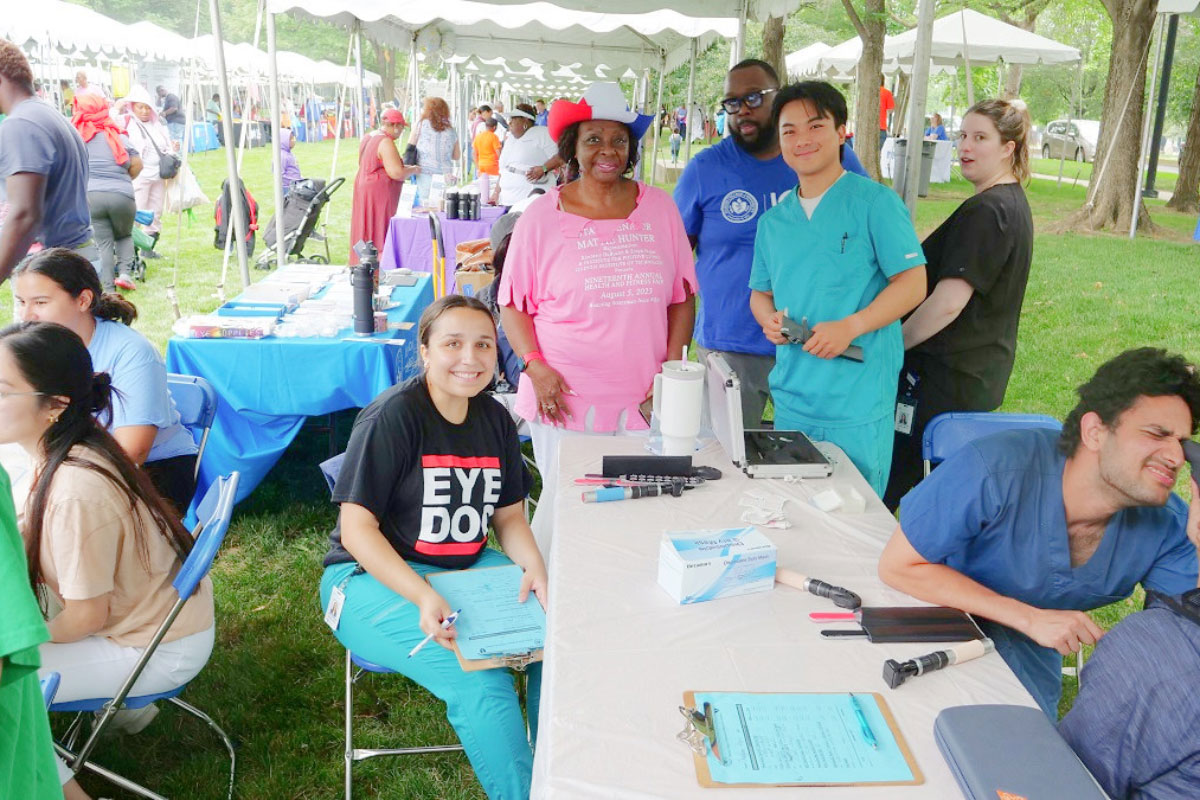- Details
- Category: Senator Mattie Hunter News
 CHICAGO – State Senator Mattie Hunter, a dedicated advocate for public health and champion of health legislation, held her annual Family Health and Fitness Fair on Aug. 5, bringing local residents together for a day of health screenings, resources and entertainment.
CHICAGO – State Senator Mattie Hunter, a dedicated advocate for public health and champion of health legislation, held her annual Family Health and Fitness Fair on Aug. 5, bringing local residents together for a day of health screenings, resources and entertainment.
“Year after year, this health fair serves as a way to extend essential health services and information directly into our community,” said Hunter (D-Chicago). “By offering these free resources — including diabetes and kidney screenings and school physicals — we are encouraging families to prioritize their well-being.”
Read more: Hunter promotes community wellness at annual health fair
- Details
- Category: Senator Laura Fine News
 SPRINGFIELD – State Senator Laura Fine and State Representative Jennifer Gong-Gershowitz’s initiative to limit the consumption of single-use plastics and polystyrene by state agencies has just been signed into law. The Degradable Plastic Act, SB 58, prioritizes sustainability by banning the purchase or use of polystyrene or styrofoam by state agencies and universities by January 1, 2025.
SPRINGFIELD – State Senator Laura Fine and State Representative Jennifer Gong-Gershowitz’s initiative to limit the consumption of single-use plastics and polystyrene by state agencies has just been signed into law. The Degradable Plastic Act, SB 58, prioritizes sustainability by banning the purchase or use of polystyrene or styrofoam by state agencies and universities by January 1, 2025.
“By finding environmentally friendly alternatives to styrofoam, this new law allows the state government to lead the way in protecting our environment,” said Fine (D-Glenview). “Because it is so lightweight and easily breaks apart into smaller pieces, styrofoam tends to drift away. Since it is used so much in disposable packaging, polystyrene is one of the largest causes of global pollution.”
- Details
- Category: Senator Bill Cunningham News
 CHICAGO – State Senator Bill Cunningham is alerting his constituents about big changes to how Illinois issues driver’s licenses. Starting September 1, anyone looking to renew their license, or get one for the first time, will have to make an appointment before visiting a Secretary of State office.
CHICAGO – State Senator Bill Cunningham is alerting his constituents about big changes to how Illinois issues driver’s licenses. Starting September 1, anyone looking to renew their license, or get one for the first time, will have to make an appointment before visiting a Secretary of State office.
The new appointment-only program, called “Skip-the-Line,” is being introduced by Secretary of State Alexi Giannoulias to end the dreaded ritual of waiting in line for hours to renew a driver’s license.
“This new approach should drastically improve the experience of getting a driver’s license in Illinois,” said Cunningham, a Democrat who represents portions of Chicago and the Southwest Suburbs. “However, it will take some getting used to for both motorists and the Secretary of State’s office, so it’s important that Illinois residents familiarize themselves with the appointment-only process to make the transition as smooth as possible.”
The easiest way to book an appointment is to visit the Secretary of State’s website at www.ilsos.gov. Visitors can easily search for appointments by facility, date and time. Those who do not have access to a computer or are uncomfortable using one can call (844) 817-4649 to schedule an appointment with an operator.
Motorists seeking some other vehicle-related service, such as title and registration or renewing license plate stickers, are not required to make an appointment and can walk in to any Secretary of State facility. Many of those services can be accessed online as well.
In conjunction with the “Skip-the-Line” program, the Secretary of State’s office is changing operating hours at many of its facilities. Starting Sept. 1, the facilities closest to the 18th Senate District will operate as follows:
- Chicago South: 9901 S. Martin Luther King Jr. Dr., Monday–Friday, 8 a.m. – 5:30 p.m. Saturday, 8 a.m. – 12:30 p.m.
- Midlothian: 14434 S. Pulaski Rd., Monday–Friday, 8 a.m. – 5:30 p.m. Saturday, 8 a.m. – 12:30 p.m.
- Bridgeview: 7358 W. 87th St., Monday–Friday, 8 a.m. – 5:30 p.m. No Saturday hours.
- Orland Township: 14807 S. Ravinia Ave., Monday–Friday, 8 a.m. – 4:30 p.m. No Saturday hours.
“Our goal is to eliminate the Time Tax that has plagued Illinoisans for years, forcing them to stand in long lines wasting time – just to conduct basic services,” Giannoulias said. “Extending hours and requiring appointments is the most efficient way to get the services you need quickly and without the headache of unpredictable wait times.”
For more information about the “Skip-the-Line” program, visit the Secretary of State’s website.
- Details
- Category: Senator Celina Villanueva News

SPRINGFIELD - State Senator Celina Villanueva championed a newly signed law to prevent students from taking advantage of loopholes to qualify for need-based financial aid for college.
“Students who are legitimately eligible for financial aid fear not receiving such assistance at the hands of others taking part of a guardianship change scam,” said Villanueva (D-Chicago). “It’s disheartening that people are using this tactic to essentially take away aid from students who need it.”
Senate Bill 195 is a direct response to previous public reports that Illinois students became eligible for need-based education financial assistance through the practice of "opportunity hoarding." Opportunity hoarding is the practice of exploiting a loophole in the Probate Act by transferring legal guardianship from a parent to a relative or friend in lower income brackets or by declaring financial independence.
In 2019 alone, approximately 82,000 students eligible for a state grant for low-income students didn’t receive it because there wasn’t enough money. Many higher education officials believe the increase in guardianship change is at fault.
Villanueva’s law will prevent guardianship changes if the primary purpose is to reduce the financial resources available for them to qualify for need-based financial aid.
“The students of tomorrow need our help today,” said Villanueva. “I will continue to fight for more equitable educational resources and stand up for the disadvantaged students who have fallen victim to a lack of assistance because of this loophole.”
Senate Bill 195 was signed into law Friday.
- Details
- Category: Senator Julie A. Morrison News
 SPRINGFIELD – Expanding upon her previously passed legislation, State Senator Julie Morrison led a new law to prohibit pesticides on school grounds within 24 hours of students being present.
SPRINGFIELD – Expanding upon her previously passed legislation, State Senator Julie Morrison led a new law to prohibit pesticides on school grounds within 24 hours of students being present.
“Children are at higher risk for health effects from exposure to pesticides than adults because their nervous, immune, digestive and other systems are still developing, making them more susceptible to these pollutants compared to adults,” said Morrison (D-Lake Forest). “Keeping harmful chemicals away from children will protect them from a plethora of potential health problems.”
Read more: Morrison to keep children safe from harmful pesticides on school grounds
- Details
- Category: Senator Javier Loera Cervantes News
 SPRINGFIELD – State Senator Javier Cervantes’ initiative to expand personal care provider eligibility to include a person’s guardian, kin or siblings was signed into law Friday.
SPRINGFIELD – State Senator Javier Cervantes’ initiative to expand personal care provider eligibility to include a person’s guardian, kin or siblings was signed into law Friday.
“Illinois residents have been pushing for personal care provider qualifications to include family members for a long time,” said Cervantes (D-Chicago). “This law will ensure that family members can assist loved ones without hurting their eligibility for benefits.”
Read more: New Cervantes law expands personal care providers to guardians, siblings
- Details
- Category: Senator Ann Gillespie News
 SPRINGFIELD – More individuals needing prosthetic or orthotic devices will soon have them covered by insurance under a measure sponsored by State Senator Ann Gillespie that was signed into law Monday.
SPRINGFIELD – More individuals needing prosthetic or orthotic devices will soon have them covered by insurance under a measure sponsored by State Senator Ann Gillespie that was signed into law Monday.
"With this legislation, we are ensuring that those who use prosthetic or orthotic devices can acquire the most appropriate models to enhance their overall health," said Gillespie (D-Arlington Heights). "Expanding what is covered by insurance will allow more individuals to get the devices they need to regain mobility and participate in the activities they enjoy.”
Read more: Gillespie expands coverage for prosthetic and orthotic devices
- Details
- Category: Senator Meg Loughran Cappel News
 SPRINGFIELD – Women will be able to get vaginal estrogen when medically necessary without worrying if their insurance will cover it, under an initiative led by State Senator Meg Loughran Cappel that was signed into law Friday.
SPRINGFIELD – Women will be able to get vaginal estrogen when medically necessary without worrying if their insurance will cover it, under an initiative led by State Senator Meg Loughran Cappel that was signed into law Friday.
“Taking vaginal estrogen can help with the side effects many women feel going through menopause,” said Loughran Cappel (D-Shorewood). “We have to empower women and make sure they can live their best life.”
The Loughran Cappel law requires individual policy accident and health insurers to cover vaginal estrogen when it is medically necessary. The law prohibits insurers from imposing a higher deductible, co-payment, or any other cost sharing requirement on vaginal estrogen than it would for a treatment for erectile dysfunction.
Vaginal estrogen is a form of hormone replacement that is typically used to treat vaginal dryness, itching, and burning, painful or difficult urination, or the sudden need to urinate immediately. These symptoms typically occur in women who are experiencing or have experienced menopause. Vaginal estrogen can cost as low as $350 and as high as $500 because of the area of absorption and the medication itself.
“Women shouldn’t have to worry about what it’s going to cost to take care of their health,” said Loughran Cappel. “We are providing the tools to enhance all women’s lives.”
House Bill 1565 takes effect Jan. 1, 2024.
More Articles …
Page 93 of 693












 © 2025 Illinois Senate Democratic Caucus
© 2025 Illinois Senate Democratic Caucus